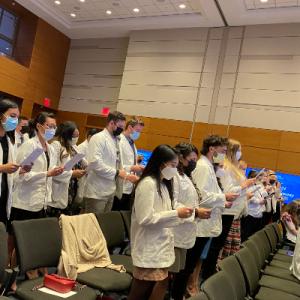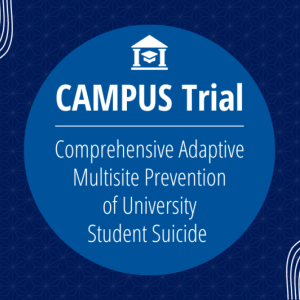Division of Urology Elevated to Department Status; Faerber Named Interim Chair
The Division of Urology within the Department of Surgery will be elevated to department status, effective July 1, 2023.
For Paul Wischmeyer, Patient Advocacy Is Personal
Paul Wischmeyer, MD, has had 27 surgeries in his life. He attributes his amazing recovery from a surgery in late 2022 to the expertise and care of his Duke Health team as well as applying precision nutrition and prescribed exercise, something that is the topic of his own research.
A Person’s Race Influences Question Asking as Much as Their Stroke History
A new study finds that race is important to consider when evaluating stroke-related communication disorders.
PA Students Don Their White Coats
The Duke Physician Assistant (PA) program held its traditional white coat ceremony in the Great Hall of the Trent Semans Center. Division Chief and Program Director Jacquelyn Barnett, DHSc, MSHS, PA-C, and other members of the faculty welcomed 91 first-year students as they begin their journey into the PA profession.
In Search Of: Early Diagnosis
Pancreatic cancer is one of the most challenging types because it is most often diagnosed in the late stages, when surgery isn’t possible. A test that has been studied in a Duke basic research lab shows promise for early detection.
Duke Health Joins with nference to Advance Medical Research and Patient Care
Duke Health is building upon its longstanding history of innovative research by joining with nference, a science-first software company, to transform healthcare by making biomedical knowledge computable.
Always Looking Forward: Teikko Artis
In 2002, Teikko Artis was in a bind. A year after starting at Duke, Artis enjoyed his work as a patient service advocate in the Department of Psychiatry and Behavioral Sciences.
Innovative Study Seeks to Improve Suicide Prevention for College Students
The Comprehensive Adaptive Multisite Prevention of University Student Suicide (CAMPUS) trial aims to test more targeted, adaptive strategies to better treat the range of students experiencing suicidal ideation.
Duke CTSI, NCCU Celebrate Five Years of Innovative Partnership
Duke University and North Carolina Central University (NCCU), a historically black college and university, celebrated a five-year partnership marked by extraordinary gains in cross-institutional educational opportunities, impactful research initiatives, and strong community outreach and support.
National Center for Child Traumatic Stress Renewed at $40 Million
The UCLA-Duke National Center for Child Traumatic Stress (NCCTS) was awarded $40 million over five years to continue raising the standard of care and increasing access to services for children and their families across the U.S. who have experienced trauma.









